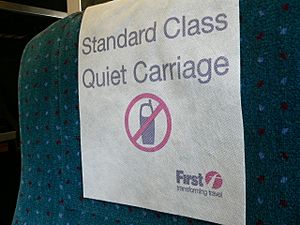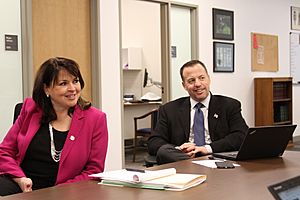Etiquette in technology facts for kids
Etiquette in technology, often called netiquette, is like a set of unwritten rules for being polite and respectful online. It helps people behave well on social media, chat sites, and other places where they connect on the Internet. These rules are different from how we act in person or on the phone.
Netiquette applies to almost all online interactions. This includes text messaging, email, online games, Internet forums, and chat rooms. While good manners in real life are something we learn early, netiquette is a newer idea.
It can be tricky to talk online without misunderstandings. This is because you can't see someone's facial expressions or body language. So, many websites have rules to prevent confusion and rude behavior. These rules are often enforced by moderators or administrators.
Contents
What is Netiquette?
Netiquette is a mix of the words network (or Internet) and etiquette. It means the social rules that help people interact well on different online networks. This includes everything from old systems like Usenet to modern blogs and forums.
These online rules are always changing and can be different in various online communities. For example, on Usenet, good netiquette often meant using short signatures. It also meant avoiding posting the same message many times or posting things that were not related to the topic. The goal was to make it easier for others to read.
Common Netiquette Rules
Some rules are important across most online places. For example, avoiding flamewars (angry arguments) and spam (unwanted messages) is always good. Another key rule is to avoid typing in all caps or using very large text. This is like shouting or yelling online.
It's also good to remember that what you post online can often be seen by many people. Even if you think a message is private, it might become public. This is especially true for things like web pages or forum posts. However, private messages or emails might feel more private to some users.
Why Netiquette Matters for Communication
Sometimes, not following netiquette can cause big problems. For example, using "reply all" in a group email when you only mean to reply to one person can flood everyone's inboxes. This can even crash email servers if too many messages are sent. In these cases, netiquette helps make sure that the technology works smoothly for everyone.
When you are talking about something someone else said, it's best to quote only a few lines. Don't copy entire paragraphs. Pick just enough text to make your point clear without making your message too long. Keep your answers short and to the point. If you write very long replies to simple questions, people might not read them.
If someone makes a mistake online, like a spelling error or a rude comment, try to be kind. If it's a small mistake, you might not need to say anything. If you feel strongly about it, think twice before reacting. Having good manners yourself doesn't mean you should correct everyone else. If you do decide to tell someone about a mistake, do it politely. It's often better to send a private email instead of correcting them in public. Assume they just didn't know better. Don't be arrogant or self-righteous about it.
Netiquette in South Korea
In South Korea, there has been a focus on teaching netiquette. In 2000, the Korea Internet Safety Commission created the 'Netizen Ethics Code'. The Ministry of Education also made 'Information Communication Ethics Education Guidelines' in 2001. Because of this, some middle and high schools started teaching netiquette.
Here are some basic netiquette rules taught in South Korea:
- Messages on a noticeboard should be clear and short. They should use correct grammar and spelling. Avoid arguing too much with other people's writings.
- When sending an email, always say who you are.
- When chatting, introduce yourself first. Use polite titles like "Nim" (a respectful term). Avoid rude or sarcastic comments.
- It's bad manners to repeat the same words many times.
- Always say goodbye when you leave a chat.
- Following people online (stalking) and using bad language are not allowed.
Digital Citizenship
Digital citizenship is about how a person should act when using technology online. It also means being able to take part in society through online tools. This idea is often talked about with Internet safety and netiquette.
The term "digital citizenship" has been used since 1998. Its meaning has changed as technology has grown and people interact online in new ways. Some schools now teach classes on digital citizenship. Some people even say that being a good digital citizen can be seen in how much you take part in online activities.
Cell Phone Etiquette
How we use cell phones and good manners has become an important topic. Cell phones are used everywhere now, even in places where phones weren't used before. This has made people think about the unwritten rules of politeness when it comes to phones.
In Schools
Most schools in the United States, Europe, and Canada have banned cell phones in classrooms. This is because phones can distract students and be used for cheating during tests. In the UK, having a cell phone during an exam can lead to being kicked out of that subject or all subjects. This is true even if the phone was turned off. In New York City, students couldn't bring cell phones to school until 2015.
Many schools do allow students to have cell phones for safety reasons. This became more common after events like the Columbine High School massacre. However, most schools don't officially allow students to use phones during class time, except for emergencies.
In Public Places
Talking or texting on a cell phone in public can bother many people. When you are in a group, using your phone can be a distraction. It can also create a barrier to talking with family and friends. In recent years, society has become less accepting of cell phone use in public places. This includes public transportation, restaurants, and more. Campaigns like "Stop Phubbing" (snubbing someone by looking at your phone) have made people think about how phones should be used when others are around.
Different cultures have different rules for cell phone use. For example, in Western society, cell phones are often allowed during free time at schools. But in some Eastern countries, phones are strictly banned on school property.
Using a mobile phone can be very rude in certain situations. This includes phones ringing during funerals, weddings, in bathrooms, cinemas, or theaters. Some book shops, libraries, doctors' offices, and places of worship ban phones so that others are not disturbed. Some places even use special equipment to block phone signals. Newer auditoriums sometimes have wire mesh in the walls. This creates a Faraday cage that stops signals without breaking signal jamming laws.
In Finland, phone companies and public transport groups have started campaigns. They remind people to be polite when using phones on public transport. They focus on talking quietly and not discussing private matters loudly.
Trains, especially those for long trips, often have "quiet carriages." In these areas, phone use is not allowed, much like old non-smoking carriages. However, in the UK, people sometimes ignore this rule because it's not always enforced. In Japan, it's generally considered rude to talk on a phone on any train. Sending emails is usually the preferred way to use a phone there. Some cities, like Graz in Austria, have even banned talking on phones on their trams and buses since 2008. Texting and emailing are still allowed.
Within Families
Cell phones can change how families interact. Teenagers often use their phones to get more freedom from their parents. For example, they might use phones to extend curfews when they are out.
However, cell phones can also cause a disconnect within families. Children might spend so much time on their gadgets talking to friends that it affects their relationship with parents. Teenagers often feel more independent because of their phones. This has changed family life. Parents might become more like friends with their children. Some people worry that this means children are not getting enough guidance. Limiting time with friends is harder now because of how much cell phones are used.
Netiquette vs. Cell Phone Etiquette
Cell phone etiquette depends a lot on the culture and what is considered polite. For example, in some cultures, using your phone while in a group is seen as rude. But in other cultures, it might be viewed differently. Cell phone etiquette also includes what you are doing on the phone and the type of messages you are sending.
New Technology and Behavior
One big challenge in online communication is the lack of emotional clues. In person, we see facial expressions and body language that show how someone feels. On the phone, we hear their tone of voice. But in chat rooms, instant messages, and texts, these clues are missing.
To help with this, people have created things like emoticons and abbreviations. Emoticons use punctuation marks and symbols to show facial expressions. For example, `:)` can mean a smiling face, showing happiness. To show laughter, people use "LOL" (which means "laughing out loud"). Other common abbreviations are "BRB" ("be right back") and "TTYL" ("talk to you later").
As new ways to communicate appear, apps like Snapchat are developing their own rules. Snapchat lets users send pictures or videos that disappear after a few seconds. Some people use Snapchat just for talking, while others use it to share quick updates about their day. Newer updates to Snapchat, like adding instant messaging, are made for those who use the app to send messages back and forth.
Images for kids
See also
 In Spanish: Netiqueta para niños
In Spanish: Netiqueta para niños
- Digital citizen
- Eternal September
- Restrictions on cell phone use by U.S. drivers
- Shotgun email
 | DeHart Hubbard |
 | Wilma Rudolph |
 | Jesse Owens |
 | Jackie Joyner-Kersee |
 | Major Taylor |




